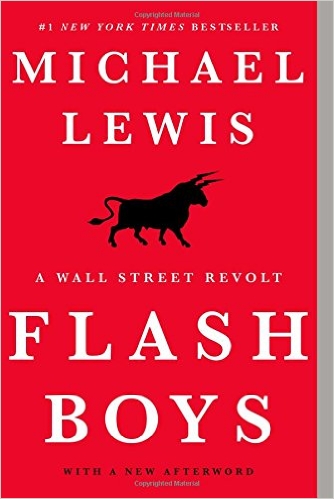Michael Lewis is a wonderful raconteur and our favourite financial writer. He brings his financial stories to life, taking the drudgery out of understanding the financial markets. One of the first financial books we reviewed on the Financial Pipeline during the 1999 dot.com craze was Lewis’ “The New New Thing”, the story of Jim Clark (of Netscape fame) trying to digitize the delivery of U.S. health care with WebMD. From the psychopathic bond-trading floor of Liar’s Poker to the Icelandic financial bubble of The Big Short, Lewis draws his readers deeply into his stories. With all of Lewis’ books, one is often left wondering if his stories are fact or fiction.
Lewis does not disappoint with Flash Boys. He recounts how Brad Katsuyama, a wholesome Canadian who traded stocks on Wall Street, discovered the rigging of equity trading in favour of electronic trading hedge funds. After noticing that his equity trading at RBC Capital Markets had deteriorated into electronic smoke and mirrors that benefited those seeking to front run his clients, Katsuyama and his team created a work around. This took away the artificial advantages that had benefitted the “algos” or hedge funds that specialized in algorithmic trading. Other Wall Streeters were astounded that Katsuyama did not use his insight to pick off his clients.
The pitfalls of electronic trading are not news to our portfolio managers, as we had found small 100 share bids “pennying up” in front of our actual trading programs. The bids and offers tended to “fade” or disappear when actual volume developed. These sort of electronic trading strategies allowed people to gather information from potential buyers or sellers and then position in front of them. The amazing thing, as Katsuyama and his merry band of rebels found out, was that this was allowed – if not encouraged – by the stock markets and regulators.
Since most of the regulators had no idea of what these computer programs actually did, they promoted them as a way to “deepen” trading. As Lewis writes, “ ‘liquidity’ was one of those words Wall Street people threw around when they wanted the conversation to end, and for brains to go dead, and for all questioning to cease.” The exchanges even competed with each other to provide the best advantages to algorithmic traders to exploit the “real money” investment flows. If a human trader told people what his clients were doing to allow them to front-run them, it would be an obvious violation of market integrity and regulation. Since it was the amoral “machines,” they were given a complete pass by regulators in the interest of the automation of trading.
As with most Michael Lewis’ books, Flash Boys astounds and provokes the reader with the realization that “this sh#$@t actually happened!” If you think that Wall Street has turned the financial markets into a casino, with the game rigged in favour of the insiders, Flash Boys provides you with ample proof.
The stunning thing is that the regulators aided and abetted the evildoers in the interest of “market efficiency.” After CBS news magazine 60 Minutes interviewed Lewis about Flash Boys, the regulators were forced to actually take a look at the sordid world of algorithmic trading and the investigations are still ongoing.
A fun and fascinating read suitable for all levels of financial knowledge. We rate Flash Boys AAA for Quality and $$$$ for Value.


